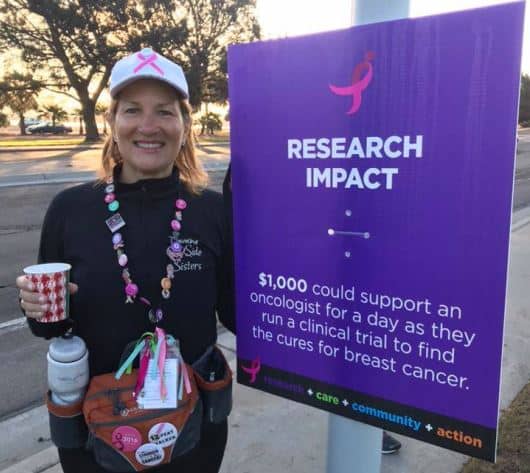
Whether you’re healthy, have just been diagnosed with breast cancer or are living with metastatic breast cancer, the connection between breast and bone health is vital. Some breast cancer treatments can affect bone health, putting women at higher risk for bone density loss. The bones are also the first site of metastases for almost half of women diagnosed with metastatic breast cancer, which can lead to bone complications including bone fractures and spinal cord compressions.
Kim was first diagnosed with breast cancer almost 20 years ago. When she completed treatment, she imagined cancer was behind her. While she knew disease recurrence was something that happened, she wasn’t concerned about it. “My oncologist and radiologist both told me they weren’t going to worry about me,” she recalled. “At the time, they said I was going to be fine. I assumed I was going to be fine.”
Almost 10 years past her initial breast cancer diagnosis, Kim began to experience back pain. After an MRI, CT scan and a bone biopsy, she learned she had metastatic breast cancer. “I didn’t understand the risk of recurrence,” she said. “And I didn’t know that if the breast cancer came back, it could affect my bones.”
It’s important to know the connection between breast and bone health, the questions you can ask your doctor and the actions you can take to ensure your bones stay as healthy as possible.
In hindsight, Kim wishes she would have known her odds of recurrence, as well as an understanding of what bone pain feels like. “People throw their backs out, they have trouble with their spines,” she said. “In my case, my spine was hot to the touch. If you feel heat, if you get pain that doesn’t go away, you need to do something.”
Kim was prescribed bone strengthening medication. She undergoes physical therapy, eats well and tries to stay as active as possible. Recently, she and her husband hiked 30 miles during vacation and she participates in Komen’s 3-Day. “These are things I enjoy,” she said.
Kim encourages people undergoing treatment for breast cancer to advocate for themselves and ask questions, including:
- How often should I have a bone density test and what do the results mean?
- Am I at risk for bone fractures and if so, what medications do I need – over the counter or prescription?
- How will diet and exercise affect my bone health?
- What should I look out for regarding side effects?
- What might bone pain or weakness mean?
- What should I do to keep my bones healthy?
Find more questions to ask your doctor about bone protection here.
“Use your voice. Take control of your health and understand the risk of recurrence. Cancer is not cookie cutter,” Kim said. “Women don’t advocate enough for themselves. Ask questions and then ask more questions. You are the authority of your own body.”
Learn more about breast and bone health.




